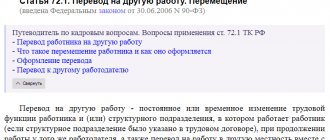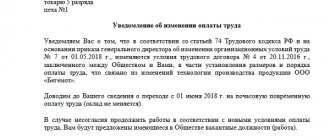Home / Labor Law / Employment / Employment contract / Collective labor agreement
Back
Published: 07/25/2016
Reading time: 10 min
0
2392
One of the most important local acts of an enterprise is a collective agreement, which is concluded between the parties to labor relations both in the organization and with an individual entrepreneur.
It regulates the most important terms and conditions of work in the company and must be drawn up in accordance with legal requirements.
It is worth considering what conditions cannot be included in this document and what should be done if such a violation is detected by employees.
- Legislation
- What conditions can worsen the situation of workers? Salary
- Working hours (working and rest time)
- Labor discipline
What working conditions are considered essential?
In accordance with Article 57 of the Labor Code of the Russian Federation, an agreement with an employee must contain a number of mandatory information:
- labor function according to the position in the staffing table;
- place of work, including the address of a separate unit;
- work start date;
- payment system;
- working hours and rest breaks;
- type of work (for example, the need for business travel);
- specific conditions in the workplace.
Transformations in the company
To make changes to the contract, the employee's consent is required. However, the employer, on his own initiative, has the right to revise previously agreed provisions if new methods of organizing work do not allow them to be maintained in their previous form.
Important! One of the essential conditions that cannot be changed without the consent of the employee is the labor function.
Organizational working conditions
These are forms and methods of organizing activities and management in a company. Russian legislation does not establish a list of changes to conditions, but Art. 74 of the Labor Code of the Russian Federation makes an attempt to explain what they can be. Structural reorganization is given as an example.
In 2004, there was a need to clarify these provisions of the Code, and the Supreme Court of Russia recommended that changes in the organizational environment include the following:
- updating the company structure;
- optimization of work and rest schedules;
- rationing labor in a new way;
- change in workload for a particular position.
This list is not exhaustive and may be expanded.
Technical working conditions
They are characterized by:
- composition of the equipment used;
- technological equipment;
- level of automation and modernization;
- the size of the production area.
Technical changes include, but are not limited to:
- improvement of technological processes;
- introduction of additional types of services;
- workshop refurbishment;
- updating work regulations.
Important! Organizational and technical conditions are closely related and often interdependent.

New conditions require new competencies
What conditions can worsen the situation of workers?
The provisions included in the collective agreement are determined by agreement between the parties. In Art. 41 of the Labor Code of the Russian Federation provides an approximate list of such conditions, but it is not mandatory or exhaustive. The parties themselves decide which sections the document will consist of.
In order to determine which provisions of the contract may worsen the situation of workers, it is worth considering the individual sections of this document:
Salary
This condition is one of the most important in regulating labor relations.
This section specifies the following points:

- the current remuneration system;
- frequency of payment of wages;
- the procedure for calculating vacation pay and dismissal payments;
- overtime pay, etc.
Examples of conditions that make a worker's situation worse include:
- payment of wages once a month (must occur at least twice);
- setting the salary for full-time work below the minimum wage;
- payment of wages twice, but without specific dates or indicating the period “from” “to” (dates must be specified exactly);
- transferring the amount of vacation pay a day or two before the start of the vacation (this should occur at least three days before it starts);
- payment of wages to a dismissed employee on the day when it is transferred to all other personnel (must occur on the day of dismissal);
- establishing the amount of overtime pay without specifying a specific figure (or with an additional payment of 10, 20 or 30%).
In the latter case, payment must be made for the first two hours of work at least one and a half times the amount, for the subsequent time - double.
Working hours (working and rest time)
This group of conditions is also very important and may include the following items:
- length of the working day or week;
- the type of time tracking that is maintained in the company (daily, weekly or summarized at your choice);
- duration of leave (including additional leave provided for certain categories of employees).
In this case, typical violations are:

- establishing a working day or week of more than 8 and 40 hours, respectively (except for cases with cumulative accounting);
- provision of leave lasting less than 28 calendar days;
- establishing a working week for minor employees (from 16 to 18 years old) of more than 35 hours;
- providing additional leave to subordinates who work irregular working hours, less than three days;
- the employer’s right to draw up his own vacation schedule and distribute rest time among subordinates (the schedule must be drawn up taking into account the opinion of employee representatives);
- drawing up a vacation schedule for the calendar year for which it is issued (this must occur at least two weeks before the start of the year);
- providing a lunch break of less than half an hour per day.
Labor discipline
This section often contains violations related to the following issues:
Establishment of additional types of disciplinary sanctions against subordinates. In accordance with Art. 192 of the Labor Code of the Russian Federation, only the following types are provided:
- comment;
- rebuke;
- dismissal.
Employers sometimes include other penalties in the contract (severe reprimand, fine, demotion), the use of which is illegal.
Internal labor regulations were developed without consultation with subordinates. By law, these rules are approved taking into account the opinion of their representative body.
In addition, conditions that worsen the situation of workers include:

- presenting a requirement to them to provide documents not provided for by the Labor Code of the Russian Federation;
- establishing additional reasons for dismissal (other than those contained in the Labor Code of the Russian Federation);
- the possibility of recalling an employee from vacation without his consent;
- inclusion of a condition regarding the need to pay for personal protective equipment (they must be provided free of charge);
- the possibility of recruiting minors or pregnant women to work in harmful or dangerous conditions;
- imposing full financial responsibility on employees without concluding an appropriate agreement with them.
Also, a violation when drawing up a contract may be the presence of references to legislative acts that have already lost force and are invalid.
For example, the Federal Law “On Collective Bargains and Agreements” is very often mentioned, instead of which certain provisions of the Labor Code of the Russian Federation now apply.
The purpose of a collective agreement, first of all, is to provide employees with conditions that compare favorably with those guarantees that are already provided by law.
That is, these could be various payments, benefits, additional vacations, etc.
It makes no sense to simply duplicate the provisions of existing legislative acts and include them in the document , since they already apply to all employees.
You will find an additional agreement to the employment contract on the transfer of an employee and the rules for filling it out in our material. What are incentive payments and who is entitled to them? Read more about this in our article. Are you preparing for retirement? Then this material will be useful to you.
Reasons why changes are made to an employment contract
Transformations in an organization can take on any scale - from a trivial change of the company’s name to its complete reorganization.
Renaming an organization
Working conditions class 3 subclass 3: additional pay and benefits
When renaming a legal entity, there is no requirement to make changes to contracts with personnel, since this fact does not in any way affect the rights and obligations. But there remains a need to make an appropriate information entry in work books and familiarize employees with the changes that have occurred.
Renaming a position (profession)
The job title is part of the employee's function. According to Art. 57 of the Labor Code of the Russian Federation, if the performance of certain work is related to the right to compensation and receipt of benefits or is subject to restrictions, the exact name of the position must be clarified in a special qualification directory approved by the government. The renaming can be justified by organizational and technical changes.
Note! Regardless of whether the new name entails a change in job responsibilities, an additional agreement will have to be concluded: the designation of the position is a mandatory clause of the contract, and its renaming is a change in the essential working conditions.
Algorithm of actions when renaming:
- Prepare a justification, for example, “due to an increase in the number of clients served.”
- Notify the relevant person in writing against signature two months before the date of entry into force of the innovations.
- Sign an additional agreement.
- Issue an order to amend the staffing table (if it did not previously provide for a position).
- Make entries in personnel documents.
Change of jurisdiction or reorganization
The Labor Code of the Russian Federation indicates that changes in accountability, merger, accession, division are not grounds for termination of the contract. It is also not necessary to conclude an additional agreement. Instead, information about the reorganization of a legal entity is entered into work books with a reference to the relevant decision. The entry is made in the same way as renaming an employer.
When do working hours change?
The working regime can be revised by the employer unilaterally only due to changes in organizational and technical working conditions, that is, a legal justification for such a step is required. An order is being prepared to amend the internal labor regulations in force at the enterprise, with subsequent notification of employees about the upcoming changes. Their agreement with the new work schedule is documented in an additional agreement.

There was news about a change in operating hours
Is it possible to change the duration of an employment contract?
As a general rule, agreements are of unlimited duration. A fixed-term contract is concluded in exceptional cases, indicating the reason in accordance with the Labor Code of the Russian Federation and other legislative acts, for example, for the duration of the duties of an absent employee.
It is possible that the inspection authorities will consider the basis for a fixed-term agreement to be unlawful and recognize it as indefinite. In other words, if the essence and content of the function performed do not change when the organizational and technical working conditions change, it will not be possible to shorten the duration of the contract.
Termination of contract
If there are no suitable positions or the employee refuses further cooperation, an order is drawn up to terminate the employment relationship under clause 7, part 1, art. 77 of the Labor Code of the Russian Federation. In this case, execution of documents for dismissal with reference to clause 3, part 1, art. 77 of the Labor Code of the Russian Federation, that is, termination of a contract on the initiative of an employee, is unacceptable.
The termination procedure begins if:
- The citizen refused the employer’s offer to transfer to another position. This fact is confirmed by the mark that he put on a copy of the notice belonging to the employer after reading the document.
- The employee wrote a special statement refusing the vacancies offered to him by the administration of the enterprise.
The statement drawn up by the employee must be registered in accordance with the organization’s regulations on record keeping. After which the document must be sent to the manager to obtain a resolution on drawing up an order to dismiss the employee. The application is then submitted to the company’s HR department to complete all necessary documentation.
Making an order
The termination of an employment relationship with an employee must always be formalized in the form of an order from the manager, drawn up in a unified form approved by law. So, the document must include the following information:
- Date of preparation.
- Order number.
- Employee contract number.
- Reason for dismissal: lack of suitable vacancies or refusal of the employee to be transferred to another place.
- Link to the corresponding article of the Labor Code of Russia.
- List of documents that became the basis for termination of cooperation. For example, an order to change working conditions, notification of available jobs or their absence, a specialist’s statement of refusal to continue working.
The completed order is submitted for signature to the head of the enterprise, after which it is registered in the order journal with a number assigned. Then the employee should be familiarized with this document against his signature.
If a citizen refuses to sign an order, then it is necessary to draw up a corresponding act and verify it with the signatures of two witnesses.
Application for dismissal of personnel of clause 7 of Art. 77 of the Labor Code of the Russian Federation, according to the comments to the new edition of the regulatory legal act, does not provide special guarantees for categories of citizens usually protected from contract termination. That is, in this case, even a single mother with children under 14 years of age or a disabled person can be fired.
Filling out a personal card
The employee’s personal card is located in the organization’s HR department. It contains all information regarding the admission, retraining, receipt of disciplinary sanctions and dismissal of the employee.
In this situation it is filled in as follows:
- Based on the order to terminate the contract, a corresponding entry is made in the citizen’s personal card.
- The employee confirms his familiarity with the specified information with a personal signature on the pages of the document.
- The employee’s signature is confirmed by the signature of the organization’s HR specialist.
After a citizen’s dismissal, his personal card remains in the enterprise’s personnel department. Typically, a separate storage location is allocated for this type of documentation.
Final payment
At the end of the employment relationship, each employee must receive a full payment. If dismissal is made under clause 7, part 1, art. 77 of the Labor Code of the Russian Federation, payments should be as follows:
- Salary for the period worked.
- Compensation for unused vacation.
- Payment for sick leave if the employee was sick.
- Bonus payments, if provided for by the collective agreement.

In the event of termination of the employment agreement under clause 7, part 1, article 77 of the Labor Code of the Russian Federation, severance pay for the employee is equal to two weeks’ average earnings. These payments must be made on the employee's last working day.
Entry in the work book
All entries in the work book must be made in accordance with the wording established by the Labor Code of the Russian Federation.
They must be certified by the signature of the employee responsible for the preparation of this document and the seal of the organization. The owner of the book must also confirm his agreement with the entry made by putting his signature on it. The document is issued to the citizen personally on his last working day. In this case, the employee is required to sign in the journal for issuing work books.
When production technology or organizational structure changes at an enterprise, this process always affects employees. Most often this is expressed in updating the provisions of the employment agreement. If an employee does not want to continue working under new conditions, then the employer has the right to dismiss him in accordance with clause 7 of Art. 77 Labor Code of the Russian Federation.
Form and period of notification to the employee about changes in working conditions
Certification of workplaces or special assessment of working conditions
The employer is required to notify staff of future changes. This must be done in writing within the following deadlines:
- if the employer operates as an individual entrepreneur - no less than 14 calendar days;
- For legal entities, the notice period is two months.
The document must contain a description of the upcoming transformations, as well as an indication of the local regulatory act in accordance with which they are being implemented. Such an act could be, for example, an order to introduce a new technical regulation.
General procedure for registering changes made
Similar jobs: special assessment of working conditions
Updated working conditions are drawn up in the form of an additional agreement and included in personnel documents.
Order to change working conditions
Based on the signed agreement, an order is issued to transfer the employee to another position. He must familiarize himself with the contents of the document, which will be confirmed by the signature in the “Acquainted” column on the administrative document. At the request of the employee, a copy of the order is issued.
Making changes to personnel documentation
After the order is issued, new data is entered into the work book and personal card. Personnel affected by the changes should be aware of the relevant records.

Personnel documents must be updated
Possible changes at the enterprise
Judicial practice shows that in order to recognize the legality of the dismissal of a specialist under paragraph 7 of part one of Article 77 of the Labor Code of the Russian Federation, the employer must prove the existence of a connection between updates to the provisions of the employment contract and changes in the structure of the organization or production conditions. At the same time, it is important to consider what actions of the employer relate to such changes.
Organizational changes are considered:
- Changes in the structure of enterprise management.
- Introduction of new forms of organization of the production process, for example, the creation of teams.
- Structural reorganization, that is, redistribution of production responsibilities between departments, areas or individual specialists.
Changes in technological conditions are also reflected in the employment contract with the employee. These include:
- technological process update;
- installation of new mechanisms;
- release of new types of products;
- updating technical regulations.

Other reasons for making changes to a specialist’s contract, for example, a deterioration in the financial situation of the company, cannot be regarded as significant changes in the organization or technology of the production process. Therefore, they are not grounds for dismissal due to a significant change in working conditions.
Additional terms of the agreement
They are not mandatory and are included by agreement between the employee and the employer, that is, it is unlawful to insist on their inclusion. From Art. 57 of the Labor Code of the Russian Federation it follows that the main requirement for them is not to worsen the employee’s position in comparison with labor legislation, a collective agreement, and internal documents.
Examples of additional conditions:
- establishing a probationary period after transfer to a new workplace;
- requirement of non-disclosure of secrets protected by law;
- the obligation to work in the organization for a certain period of time after completing the training required for the new position, if it was paid for by the employer.
The document may duplicate the rights and obligations of the employee and the employer prescribed in the collective agreement. Their absence in the text is not considered a refusal to exercise rights and fulfill obligations.
If the employee does not refuse in writing to continue the employment relationship
In practice, there are cases when an employee does not want to sign a notice of a change in working conditions - in legal terms, this means a refusal to familiarize himself. The employer's representative, in the presence of a witness, reads out loud the contents of the document and draws up an act of forced reading of the notice due to the fact that the recipient ignored the procedure. To obtain the force of a legally significant document, the act must contain the necessary details: date, place of preparation, signatures of the representative and witness.
Additional Information! Acts are drawn up in a similar way when refusing to familiarize yourself with other documents related to innovations.
Notification of no vacancies
A specialist who does not agree to the new working conditions must be officially notified of the absence of suitable positions at the enterprise. Drawing up such a document will allow the employer not only to properly notify the employee, but also to prove his case in the event of litigation.
Notifying the employee involves:
- drawing up a written notice in two copies;
- signing of the document by the employer;
- registration of notice;
- familiarization of the employee with the document for signature;
- placing a copy in the specialist’s personal file for storage.
If the employee refuses to receive the notice or sign for familiarization with it, the HR department employee should draw up a report on the fact of refusal in front of witnesses. This document will confirm that the citizen was properly informed about the absence of suitable vacancies at the enterprise.
Dismissal of an employee upon refusal to continue work due to changes in working conditions
The employee has every right not to agree with the new requirements, as well as to refuse the offered vacancies (if any). A special order is issued to terminate the employment contract due to such disagreement. The person being dismissed must read the document and sign in the indicated place.
Industrial relations are unstable, and changes in working conditions are a common occurrence in economic life. Consistent compliance with legal requirements while documenting innovations will optimize work processes and help avoid legal disputes and problems during personnel audits.





